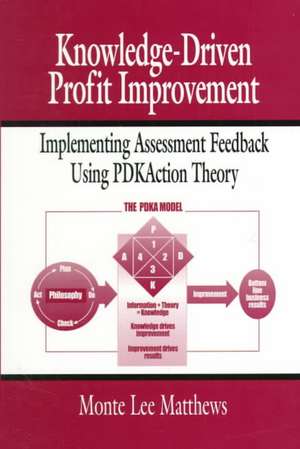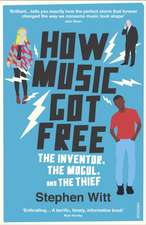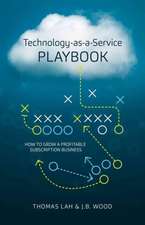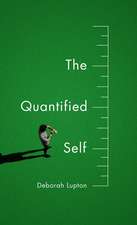Knowledge-Driven Profit Improvement: Implementing Assessment Feedback Using PDKAction Theory
Autor Monte Lee Matthewsen Limba Engleză Paperback – 23 aug 1999
The 12 step method presented in the first five chapters show you how to take information from feedback from assessments, surveys and audits, convert it into usable knowledge and get bottom line improvements. The strategy expands the plan-do-check-act (PDCA) model into a Plan-Do-Knowledge-Act (PDKA) process. The case studies provided reinforce the principles and the theory behind them.
Significant challenges face any organization intent on becoming world-class by managing knowledge effectively. They can be classified into four types: making use of your information by integrating it, organizing the different forms of information into a manageable framework, focusing equal attention on your strengths and your weaknesses, developing decision-making criteria based on key company drivers.
The12 steps outlined in Knowledge-Driven Profit Improvement: Implementing Assessment Feedback Using PDKAction Theory will show you how to make your company into a world-class organization.
Features
Contents
Preface
The Logic and Philosophy Behind the PDKA Model
Turning Knowledge into a Corporate Asset
The Importance of Bottom-Line Results
Using PDKA to Implement Assessment Opportunities
How World-Class Companies Demonstrate the Principles of the PDKA Process
How Three Quality Award Programs Implement Principles of PDKA - The President of the United States Quality Award, the United Way's Excellence in Service Quality Award, and the Northern Ireland Quality Award
How Three World-Class Private Manufacturing Companies Implement Principles of PDKA - Milliken Denmark, Pal's Sudden Service, and Ulster Carpet Mills
How Two World-Class Private Service Companies Implement Principles of PDKA - BI Performance Services and British Telecom Northern Ireland
How Two World-Class Service Organizations Implement Principles of PDKA - Royal Mail and the United Way of Middle Tennessee
How Three World-Class Government Service Organizations Implement Principles of PDKA - Federal Supply Service Northeast and Caribbean Region, Tennessee Valley Authority's Fossil & Hydro Power, and National Aeronautics and Space Administration's Kennedy Space Center
How Two World-Class Military Service Organizations Implement Principles of PDKA - Red River Army Depot and U.S. Army Armament Research, Development and Engineering Center, Picatinny Arsenal
References
Index
| Toate formatele și edițiile | Preț | Express |
|---|---|---|
| Paperback (1) | 657.47 lei 6-8 săpt. | |
| Taylor & Francis – 23 aug 1999 | 657.47 lei 6-8 săpt. | |
| Hardback (1) | 966.89 lei 6-8 săpt. | |
| Taylor & Francis – 30 sep 2020 | 966.89 lei 6-8 săpt. |
Preț: 657.47 lei
Preț vechi: 879.40 lei
-25% Nou
Puncte Express: 986
Preț estimativ în valută:
125.81€ • 131.68$ • 104.71£
125.81€ • 131.68$ • 104.71£
Carte tipărită la comandă
Livrare economică 31 martie-14 aprilie
Preluare comenzi: 021 569.72.76
Specificații
ISBN-13: 9781574442298
ISBN-10: 1574442295
Pagini: 386
Dimensiuni: 152 x 229 x 20 mm
Greutate: 0.71 kg
Ediția:1
Editura: Taylor & Francis
Colecția CRC Press
Locul publicării:Oxford, United Kingdom
ISBN-10: 1574442295
Pagini: 386
Dimensiuni: 152 x 229 x 20 mm
Greutate: 0.71 kg
Ediția:1
Editura: Taylor & Francis
Colecția CRC Press
Locul publicării:Oxford, United Kingdom
Public țintă
Professional and Professional Practice & DevelopmentCuprins
Preface -- The Author -- Acknowledgments -- 1 The Logic and Philosophy behind the PDKA Model -- 2 Turning Knowledge into a Corporate Asset -- 3 The Importance of Bottom-Line Results -- 4 Using PDKA to Implement Assessment Opportunities -- 5 How World-Class Companies Demonstrate the Principles of the PDKA Process -- 6 How Three Quality Award Programs Implement Principles of PDKA—The President of the United States Quality Award, the United Way’s Excellence in Service Quality Award, and the Northern Ireland Quality Award -- 7 How Three World-Class Private Manufacturing Companies Implement Principles of PDKA—Milliken Denmark, Pal’s Sudden Service, and Ulster Carpet Mills -- 8 How Two World-Class Private Service Companies Implement Principles of PDKA—BI Performance Services and British Telecom Northern Ireland -- 9 How Two World-Class Service Organizations Implement Principles of PDKA—Royal Mail and the United Way of Middle Tennessee -- 10 How Three World-Class Government Service Organizations Implement Principles of PDKA—Federal Supply Service Northeast and Caribbean Region, Tennessee Valley Authority’s Fossil & Hydro Power, and National Aeronautics and Space Administration’s Kennedy Space Center -- 11 How Two World-Class Military Service Organizations Implement Principles of PDKA—Red River Army Depot and U.S. Army Armament Research, Development and Engineering Center, Picatinny Arsenal -- References -- Index.
Recenzii
"Knowledge Driven Profit Improvement is a welcome addition to the improvement toolkit of business practitioners."-David Walden,
Executive Director Center for Quality of Management (retired Senior Vice President, Bolt Beranek and Newman Inc.; Senior Lecturer, MIT Sloan School of Business; co-author A New American TQM; retired Executive Director, CQM; Editor, Journal of the Center for Quality of Management ).
"The Plan-Do-Knowledge-Act model creates a new paradigm that is effective and efficient in building knowledge and adding value to both company and individual. It provides the guidance, discipline and focus to move your organization toward its true competitive potential."-Bob Barbour, Director and Chief Executive, Northern Ireland Quality Center
"Matthews' knowledge-based improvement plan offers a proactive, common sense approach to leverage the new insights gleaned from the assessment itself..."-William C. Phillips, Former Senior Director, Quality, United Way of America
"The President's Quality Award Program winners used the Knowledge to Plan, Do and Act. The results were impressive!"-Barbara Smith, Manager, The President's Quality Award Program, United States Office of Personnel Management
"The only way for our organizations to improve is to deploy feedback into actions - appropriate actions which move our business into the competitive future...the difference between mediocre and excellent organizations is the ability to analyze and integrate knowledge into action."-Marie B. Williams, Executive Director, Tennessee Quality Award
Promo Copy
Executive Director Center for Quality of Management (retired Senior Vice President, Bolt Beranek and Newman Inc.; Senior Lecturer, MIT Sloan School of Business; co-author A New American TQM; retired Executive Director, CQM; Editor, Journal of the Center for Quality of Management ).
"The Plan-Do-Knowledge-Act model creates a new paradigm that is effective and efficient in building knowledge and adding value to both company and individual. It provides the guidance, discipline and focus to move your organization toward its true competitive potential."-Bob Barbour, Director and Chief Executive, Northern Ireland Quality Center
"Matthews' knowledge-based improvement plan offers a proactive, common sense approach to leverage the new insights gleaned from the assessment itself..."-William C. Phillips, Former Senior Director, Quality, United Way of America
"The President's Quality Award Program winners used the Knowledge to Plan, Do and Act. The results were impressive!"-Barbara Smith, Manager, The President's Quality Award Program, United States Office of Personnel Management
"The only way for our organizations to improve is to deploy feedback into actions - appropriate actions which move our business into the competitive future...the difference between mediocre and excellent organizations is the ability to analyze and integrate knowledge into action."-Marie B. Williams, Executive Director, Tennessee Quality Award
Promo Copy
Notă biografică
Monte Lee Matthews - Consultant, Signal Mountain, Tennesse, USA.
Descriere
To help companies to use the information they have been accruing for years, Knowledge-Driven Profit Improvement: Implementing Assessment Feedback Using PDKAction Theory presents an innovative, radically logical way of thinking about organizational knowledge and competition. Centered on discipline, integration, and focus, the 12-step method presented shows how to take information from feedback from assessments, surveys and audits, convert it into usable knowledge, and get bottom line improvements. The strategy expands the plan-do-check-act (PDCA) model into a Plan-Do-Knowledge-Act (PDKA) process. The case studies provided reinforce the principles and the theory behind them.












